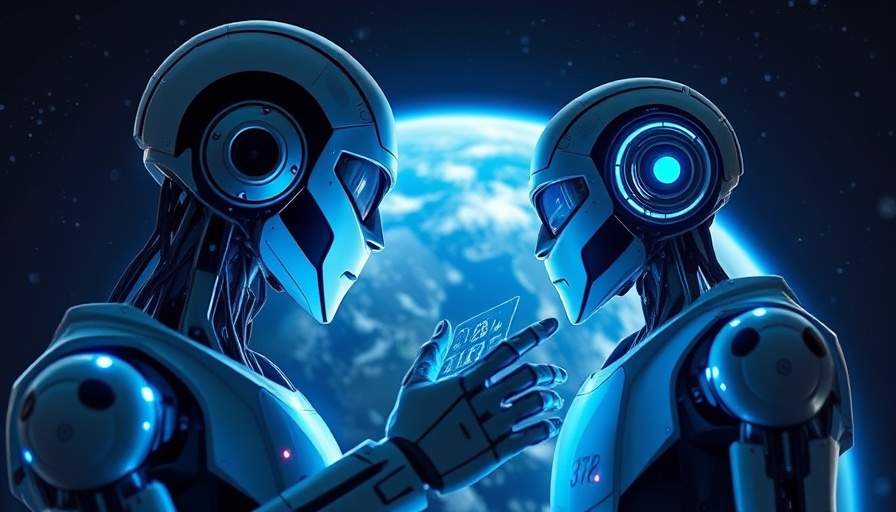
China’s Manus AI: The First Truly Autonomous Agent
The world of artificial intelligence has taken a dramatic leap forward with the introduction of Manus AI, developed by a Chinese startup. Touted as the first fully autonomous AI agent, Manus has made headlines due to its ability to operate independently, performing tasks ranging from trip planning to stock analysis without requiring constant human input.
As Yichao “Peak” Ji, the chief scientist for Manus AI, puts it, "This isn't just another chatbot or workflow. It's a truly autonomous agent that bridges the gap between conception and execution." This marks a significant growing trend in AI where the focus is shifting from mere assistance to independence and self-sufficiency, bringing forward the potential of artificial general intelligence (AGI).
How Manus Stands Out Among AI Agents
Unlike previous AI systems that serve primarily as chatbots or limited assistants, Manus claims to function on a different level entirely. The agent utilizes its own knowledge and an evolving memory, learning from its tasks to boost efficiency. Ji illustrated this by demonstrating Manus’s ability to analyze job candidates and provide evaluations, showcasing its practical application in real-world scenarios.
This advancement comes at a time of fierce competition in the AI space. Many tech experts assert that Manus’s capabilities indicate a shift toward more sophisticated and capable AI systems that could redefine interactions between humans and machines.
Implications of Autonomous AI on Society
As society increasingly integrates AI into daily operations, the emergence of Manus raises questions about ethical and practical implications. What could a future look like with AI agents managing tasks across industries? Experts suggest these autonomous systems could enhance productivity but also bring about concerns over job displacement and data security.
The prospect of AI performing complex tasks autonomously could redefine business operations, allowing companies to operate with reduced human oversight. However, there needs to be a balance in ensuring that these advancements lead to societal betterment rather than replacing human jobs en masse.
Amazon’s Financial Link to Political Figures
In a different vein, Amazon continues to draw public attention, this time for its financial connections with former U.S. President Donald Trump. The company's Prime Video service will be the exclusive platform streaming 'The Apprentice', further embedding Trump in the entertainment narrative. This move has led many to speculate about the intersection of politics and corporate interests, especially in an era where public perception can sway business operations.
These developments exemplify the complicated web of relationships between technology, politics, and media. Whether it's Amazon's continued support of a controversial figure or the rise of cutting-edge AI, the implications resonate throughout society.
The Upcoming Leadership Shift at Intel
Intel has made headlines with its appointment of Lip-Bu Tan as the new CEO, which resulted in a notable spike in company stock. This shift in leadership comes at a crucial time as the company navigates the competitive tech landscape. Tan’s experience is expected to drive Intel toward innovation, particularly in the semiconductor space that supports AI advancements.
The technology sector clings tightly to the leadership and innovations its executives bring, often functioning as a barometer for future industry trends. As businesses like Intel adapt to changes, their directions may provide insights into broader technological trends that could shape our future.
AI Chips: The New Gold Rush?
Adding to the complexity of the AI landscape is the ongoing shortage of specialized chips, which are crucial for training AI models. Companies like Meta and OpenAI are currently facing significant capacity constraints, highlighting the growing demand for AI processors amid an AI boom.
This situation leads to a fascinating scenario where the supply chain's limitations could significantly affect the pace of AI development. As organizations scramble to acquire these vital components, it sparks a broader conversation about sustainability in technology and the need for robust production capacities.
Critiques and Counterarguments on Autonomous AI
While Manus AI garners praise for its capabilities, some AI researchers present counterarguments suggesting that it might not yet be a revolutionary tool. Critics argue that despite its promising features, Manus could still be viewed as just another advanced workflow tool rather than an independent intelligent agent.
This dichotomy in perception reflects the diverse views within the AI community. As technology continues to evolve, understanding these differing perspectives will be crucial in assessing AI’s role in future developments.
The emergence of Manus AI and Amazon’s ongoing entwinement with political figures demonstrate the intersections of technology, influence, and power in our society. Staying informed on these issues is crucial, as they shape the future of technology and its impact on our lives.
 Add Row
Add Row  Add
Add 




 Add Row
Add Row  Add
Add 

Write A Comment